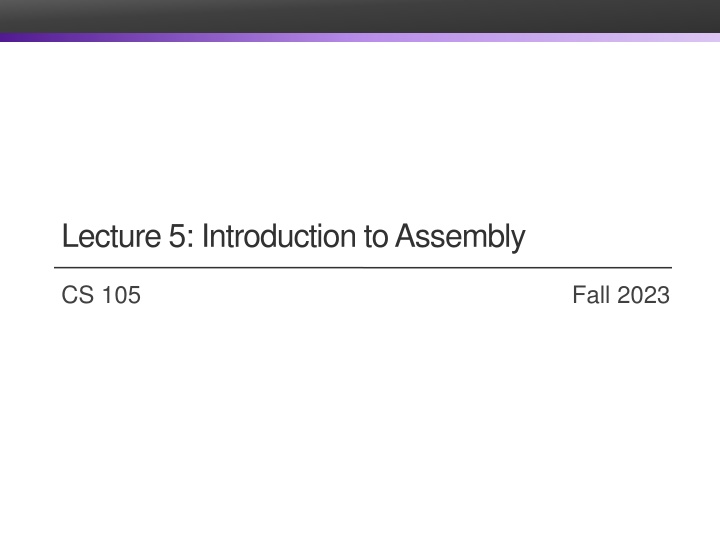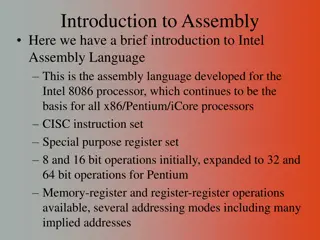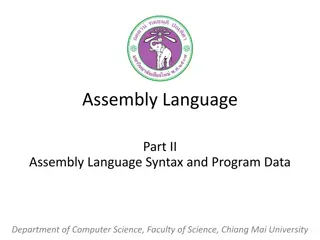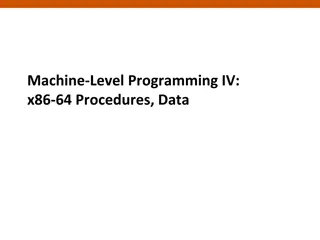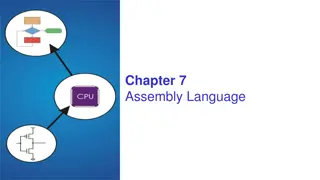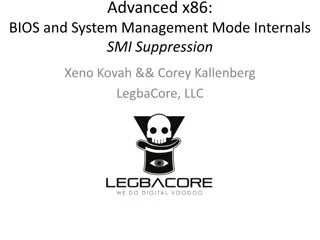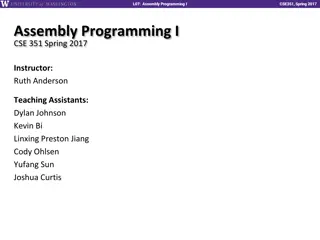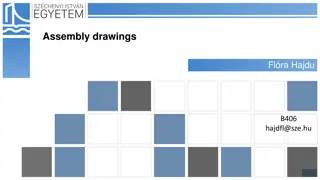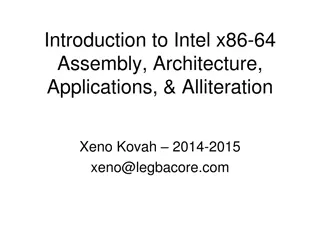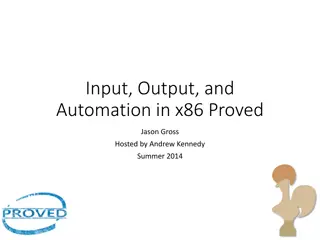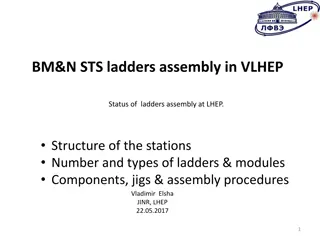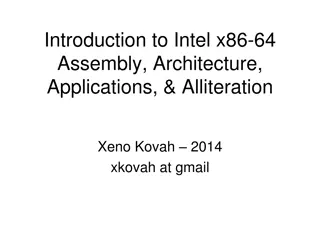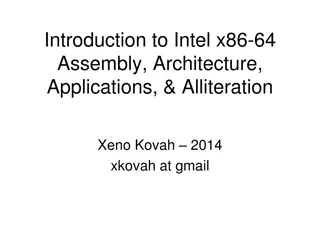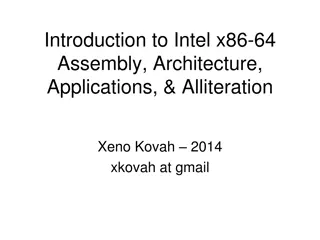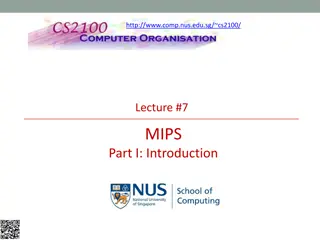Introduction to Assembly Language Evolution: x86-64 Basics
This content delves into the foundational aspects of x86-64 assembly language, tracing its evolutionary design back to the 8086 in 1978. It explores the role of x86-64 as the basis for the original IBM Personal Computer and the 64-bit instruction set of the Intel Pentium 4E in 2004. Understand the translation process of high-level languages into x86 instructions and their execution on the CPU through sequences of bytes with mnemonic names. Dive into the characteristics and functionalities of assembly/machine code, memory organization, CPU structures, and the essential instructions for data transfer, arithmetic operations, and control flow.
Download Presentation

Please find below an Image/Link to download the presentation.
The content on the website is provided AS IS for your information and personal use only. It may not be sold, licensed, or shared on other websites without obtaining consent from the author.If you encounter any issues during the download, it is possible that the publisher has removed the file from their server.
You are allowed to download the files provided on this website for personal or commercial use, subject to the condition that they are used lawfully. All files are the property of their respective owners.
The content on the website is provided AS IS for your information and personal use only. It may not be sold, licensed, or shared on other websites without obtaining consent from the author.
E N D
Presentation Transcript
Lecture 5: Introduction to Assembly CS 105 Fall 2023
Programs #include<stdio.h> 55 48 89 e5 48 83 ec 20 48 8d 05 25 00 00 00 c7 45 fc 00 00 00 00 89 7d f8 48 89 75 f0 48 89 c7 b0 00 e8 00 00 00 00 31 c9 89 45 ec 89 c8 48 83 c4 20 5d c3 int main(int argc, char** argv){ printf("Hello world!\n"); return 0; }
Compilation printf.o Pre- processor (cpp) Compiler (cc1) Assembler (as) Linker (ld) demo05.c demo05.i demo05.s demo05.o demo05 Source program (text) Assembly program (text) Modified source program (text) Relocatable object programs (binary) Executable object program (binary) #include<stdio.h> 55 48 89 e5 48 83 ec 20 48 8d 05 25 00 00 00 c7 45 fc 00 00 00 00 89 7d f8 48 89 75 f0 48 89 c7 b0 00 e8 00 00 00 00 31 c9 89 45 ec 89 c8 48 83 c4 20 5d c3 int printf(const char * restrict, ...) __attribute__((__format_ _ (__printf__, 1, 2))); int main(int argc, char ** argv){ pushq %rbp movq %rsp, %rbp subq $32, %rsp leaq L_.str(%rip), %rax movl $0, -4(%rbp) movl %edi, -8(%rbp) movq %rsi, -16(%rbp) movq %rax, %rdi movb $0, %al callq _printf xorl %ecx, %ecx movl %eax, -20(%rbp) movl %ecx, %eax addq $32, %rsp popq %rbp retq int main(int argc, char ** argv){ printf("Hello world!\n"); return 0; } printf("Hello world!\n"); return 0; }
x86-64 Assembly Language Evolutionary design, going back to 8086 in 1978 Basis for original IBM Personal Computer, 16-bits Intel Pentium 4E (2004): 64 bit instruction set High-level languages are translated into x86 instructions and then executed on the CPU Actual instructions are sequences of bytes We give them mnemonic names
Assembly/Machine Code View Memory 0x7FFF Central Processing Unit (CPU) Stack PC Registers Float registers Heap Condition Codes Data ALU Addresses Code 0x0000 Instructions Programmer-Visible State PC: Program counter (%rip) Register file: 16 Registers Float registers Condition codes Memory Byte addressable array Code and user data Stack to support procedures
Assembly Characteristics: Instructions Transfer data between memory and register Load data from memory into register Store register data into memory Perform arithmetic operations on register or memory data Transfer control Conditional branches Unconditional jumps to/from procedures
Data Movement Instructions MOV source, dest Moves data source->dest dest = source
Operand Forms Immediate: Syntax: $c Ex: $47 Val: c C Equiv: 47 Register: Syntax: r Ex: %rdi Val: Reg[r] C Equiv: x Memory (Absolute): Syntax: addr Ex: 0x4050 Val: Mem[addr] C Equiv: *0x60201a Memory (Indirect): Syntax: (r) Ex: (%rsp) Val: Mem[Reg[r]] C Equiv: *x
Exercise: Operands Register %rax %rcx %rdx Value 0x100 0x01 0x03 Memory Address 0x100 0x104 0x108 Value 0xFF 0xAB 0x13 What are the values of the following operands (assuming register and memory state shown above)? 1. %rax 2. 0x104 3. $0x108 4. (%rax)
mov Operand Combinations Source Dest Src,Dest C Analog mov $0x4,%rax x = 4; Reg Imm mov $-147,(%rdx) *p = -147; Mem mov %rax,%rcx y = x; Reg Mem mov Reg mov %rax,(%rdx) *p = x; mov (%rdx),%rax x = *p; Mem Reg Cannot do memory-memory transfer with a single instruction
Exercise: Moving Data For each of the following move instructions, write an equivalent C assignment 1. mov $0x40604a, %rbx 2. mov %rbx, %rax 3. mov $47, (%rax)
Sizes of C Data Types in x86-64 C declaration char short int long char * float double Size (bytes) 1 2 4 8 8 4 8 Intel data type Byte Word Double word Quad word Quad word Single precision Double precision Assembly suffix b w l q q s l
Data Movement Instructions MOV source, dest movb movw movl movq Move data source->dest Move 1 byte Move 2 bytes Move 4 bytes Move 8 bytes
X86-64 Integer Registers %rax %r8 %ax %al %eax %r8d %rbx %r9 %ebx %r9d %bx %bl %rcx %r10 %ecx %r10d %cx %cl %rdx %r11 %dx %dl %edx %r11d %rsi %r12 %esi %r12d %si %sil %rdi %r13 %edi %r13d %di %dil %rsp %r14 %esp %r14d %sp %bsl %rbp %r15 %ebp %bp %bpl %r15d
X86-64 Integer Registers (function result) (fifth argument) %rax %r8 (sixth argument) %rbx %r9 (fourth argument) %rcx %r10 %rdx (third argument) %r11 (second argument) %rsi %r12 (first argument) %rdi %r13 (stack pointer) %rsp %r14 %rbp %r15
Exercise: Translating Assembly Write a C function void decode1(long *xp, long *yp) that will do the same thing as the following assembly code: decode: void decode(long *xp, long *yp){ movq (%rdi), %rax movq (%rsi), %rcx movq %rax, (%rsi) movq %rcx, (%rdi) ret } Register Use(s) %rdi Argument xp %rsi Argument yp
Review: Array Allocation Basic Principle TA[L]; Array of data type T and length L Contiguously allocated region of L * sizeof(T) bytes in memory Identifier A can be used as a pointer to array element 0: Type T* char string[12]; x x + 12 int val[5]; x x + 4 x + 8 x + 12 x + 16 x + 20 double a[3]; x x + 8 x + 16 x + 24 char *p[3]; x x + 8 x + 16 x + 24
Exercise: Array Access Basic Principle TA[L]; Array of data type T and length L Contiguously allocated region of L * sizeof(T) bytes in memory Identifier A can be used as a pointer to array element 0: Type T* int val[5]; 1 5 2 1 3 x x + 4 x + 8 x + 12 x + 16 x + 20 Reference val[4] val val+1 &(val[2]) val[5] *(val+1) Type Value
Register Use(s) %rdi z Array Example #define ZLEN 5 int pomona[ZLEN] = { 9, 1, 7, 1, 1 }; int caltech[ZLEN] = { 9, 1, 1, 2, 5 }; void cycle_digits(int* zipcode){ int temp = zipcode[0]; zipcode[0] = zipcode[1]; zipcode[1] = zipcode[2]; zipcode[2] = zipcode[3]; zipcode[3] = zipcode[4]; zipcode[4] = temp; } ??? int pomona[ZLEN]; 9 1 7 1 1 36 40 44 48 52 56 int caltech[ZLEN]; 1 4 8 5 3 16 20 24 28 32 36
Operand Forms Immediate: Syntax: $c Ex: $47 Val: c C Equiv: 47 Register: Syntax: r Ex: %rbp Val: Reg[r] C Equiv: x Memory (Absolute): Syntax: addr Ex: 0x4050 Val: Mem[addr] C Equiv: *0x60201a Memory (Indirect): Syntax: (r) Ex: (%rsp) Val: Mem[Reg[r]] C Equiv: *x Memory (Base+displacement): Syntax: c(r) Ex: 12(%rsp) Val: Mem[Reg[r]+c] C Equiv: *(x+12)
Exercise: Operands Register %rax %rcx %rdx Value 0x100 0x01 0x03 Memory Address 0x100 0x104 0x108 0x10C Value 0xFF 0xAB 0x13 0x47 What are the values of the following operands (assuming register and memory state shown above)? 1. 4(%rax) 2. 8(%rax) 3. 12(%rax)
Register Use(s) %rdi z Array Example #define ZLEN 5 int pomona[ZLEN] = { 9, 1, 7, 1, 1 }; int caltech[ZLEN] = { 9, 1, 1, 2, 5 }; movl (%rdi), %rdx movl 4(%rdi), %rcx movl %rcx, (%rdi) movl 8(%rdi), %rcx movl %rcx, 4(%rdi) movl 12(%rdi), %rcx movl %rcx, 8(%rdi) movl 16(%rdi), %rcx movl %rcx, 12(%rdi) movl %rdx, (rdi) void cycle_digits(int* zipcode){ int temp = zipcode[0]; zipcode[0] = zipcode[1]; zipcode[1] = zipcode[2]; zipcode[2] = zipcode[3]; zipcode[3] = zipcode[4]; zipcode[4] = temp; } int pomona[ZLEN]; 9 1 7 1 1 36 40 44 48 52 56 int caltech[ZLEN]; 1 4 8 5 3 16 20 24 28 32 36
Register Use(s) %rdi z %rsi digit Array Accessing Example %rax return val zip_code pomona; 9 1 7 1 1 16 20 24 28 32 36 int get_digit(int* zipcode, int digit){ return z[digit]; } ???
Operand Forms Immediate: Syntax: $c Ex: $47 Val: c C Equiv: 47 Register: Syntax: r Ex: %rbp Val: Reg[r] C Equiv: x Memory (Absolute): Syntax: addr Ex: 0x4050 Val: Mem[addr] C Equiv: *0x60201a Memory (Indirect): Syntax: (r) Ex: (%rsp) Val: Mem[Reg[r]] C Equiv: *x Memory (Base+displacement): Syntax: c(r) Ex: 12(%rsp) Val: Mem[Reg[r]+c] C Equiv: *(x+12) Memory (Scaled indexed): Syntax: (r1,r2,s) Ex: (%rdx,%rsi,4) Val: Mem[Reg[r1]+Reg[r2]*s] C: r1[r2] Memory (Scaled indexed w/ displacement): Syntax: c(r1,r2,s) Ex: 8(%rdx,%rsi,4) Val: Mem[Reg[r1]+Reg[r2]*s+c] C: (r1+8)[r2]
Exercise: Operands Register %rax %rcx %rdx Value 0x100 0x01 0x03 Memory Address 0x100 0x104 0x108 0x10C Value 0xFF 0xAB 0x13 0x47 What are the values of the following operands (assuming register and memory state shown above)? 1. (%rax,%rcx,4) 2. (%rax,%rdx,4) 3. 8(%rax,%rcx,4)
Register Use(s) %rdi z %rsi digit Array Accessing Example %rax return val zip_code pomona; 9 1 7 1 1 16 20 24 28 32 36 int get_digit(int* zipcode, int digit){ return z[digit]; } movl (%rdi,%rsi,4), %eax # ret = z[digit] Register %rdi contains starting address of array zipcode Register %rsi contains array index digit Desired digit at %rdi + 4*%rsi Use memory reference (%rdi,%rsi,4)
Structure Representation r struct node { int z[5]; struct node* next; }; z 0 next 24 32 20 Structure represented as block of memory Big enough to hold all of the fields Fields ordered according to declaration Even if another ordering could yield a more compact representation Compiler determines overall size + positions of fields Machine-level program has no understanding of the structures in the source code
Register Use(s) %rdi n %rax return val Accessing Fields r r + 24 struct node { int z[5]; struct node* next; }; z 0 next 24 32 20 Accessing a field in a struct Offset of each structure member determined at compile time struct node* get_next(struct rec* n){ return n->next; } # n in %rdi movq 24(%rdi), %rax ret
C is close to Machine Language C Code Store value t where designated by dest Assembly Move 8-byte value to memory Quad words in x86-64 parlance Operands: t: Register %rax dest: Register %rbx *dest: Memory M[%rbx] Object Code 3-byte instruction at address 0x40059e *dest = t; movq %rax, (%rbx) 0x40059e: 48 89 03
